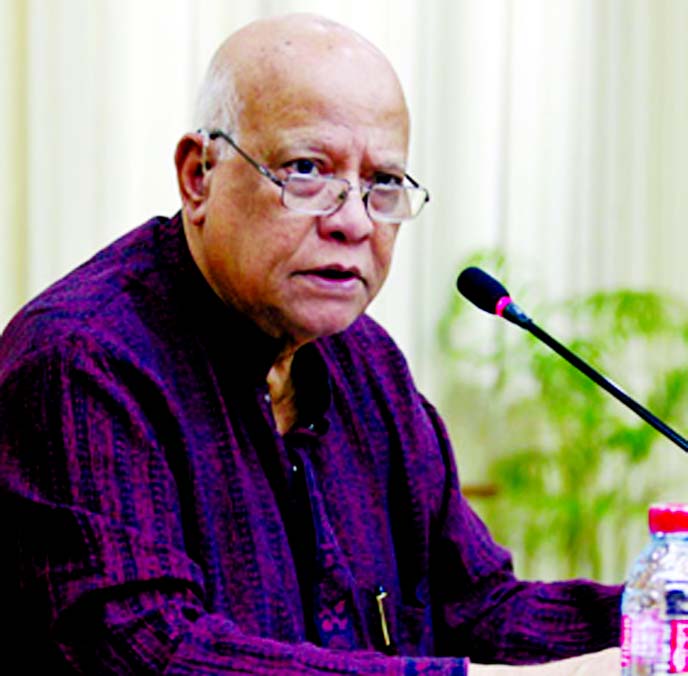
Economic Reporter :
Finance Minister Abul Maal Abdul Muhith Sunday urged the industrialists and businessmen to pay more taxes to ensure government services for developing environment friendly ‘green’ industry.
“The businessmen and industrialists should pay more taxes so that the government can take necessary steps with the extra money to prevent environmental pollution,” he said while speaking as chief guest at a seminar at Metropolitan Chamber of Commerce and Industry (MCCI) auditorium in the city.
The finance minister said ensuring waste management and other services required for green industrialization is not possible with the government’s current revenue earning.
“This will require increasing revenue earning,” he added.
MCCI and Asia Foundation jointly organized the seminar on ‘Green Industry Policy for Bangladesh: Possibilities and Challenges.’
Moderated by MCCI President Syed Nasim Manzur, the seminar was also addressed by Industries Ministry Senior Secretary M Mosharraf Hossain Bhuiyan, ACI Group Chairman Anis-ud-Doula, Bangladesh centre for Advance Studies (BCAS) Executive Director Dr. Atiq Rahman, Asia Foundation Resident Representative Hasan Majumder, Envoy Group Chairman and former BGMEA President Kutubuddin Ahmed, Bay Footwear Limited Managing Director Ziaur Rahman, Rahimafrooz Renewable Energy Limited Managing Director Munwar Mesbah Mayeen and Bangladesh Bank Sustainable Finance Division General Manager Manoj Kumar Biswas, among others.
Dr. Fahmida Khatun of Centre for Policy Dialogue (CPD) and Dr. M. Abu Yusuf of Dhaka University presented two separate keynote papers in the seminar.
The finance minister said the factory owners should take various steps, including waste management to reduce the environmental pollution.
In case of their failure, the government can do it, but that would require extra revenue income, he said, adding that the factory owners and rich businessmen should pay additional taxes for this.
Muhith suggested that instead of doing it alone, a group of 30 to 40 factory owners can set up effluent treatment plants (ETT) jointly to reduce the cost.
Referring to the formation of economic zones by the government, he said all necessary services for green industrialization have been ensured there.
The country is proceeding towards attaining sustainable development, the finance minister said and hoped that Bangladesh would be poverty-free by 2024.
Finance Minister Abul Maal Abdul Muhith Sunday urged the industrialists and businessmen to pay more taxes to ensure government services for developing environment friendly ‘green’ industry.
“The businessmen and industrialists should pay more taxes so that the government can take necessary steps with the extra money to prevent environmental pollution,” he said while speaking as chief guest at a seminar at Metropolitan Chamber of Commerce and Industry (MCCI) auditorium in the city.
The finance minister said ensuring waste management and other services required for green industrialization is not possible with the government’s current revenue earning.
“This will require increasing revenue earning,” he added.
MCCI and Asia Foundation jointly organized the seminar on ‘Green Industry Policy for Bangladesh: Possibilities and Challenges.’
Moderated by MCCI President Syed Nasim Manzur, the seminar was also addressed by Industries Ministry Senior Secretary M Mosharraf Hossain Bhuiyan, ACI Group Chairman Anis-ud-Doula, Bangladesh centre for Advance Studies (BCAS) Executive Director Dr. Atiq Rahman, Asia Foundation Resident Representative Hasan Majumder, Envoy Group Chairman and former BGMEA President Kutubuddin Ahmed, Bay Footwear Limited Managing Director Ziaur Rahman, Rahimafrooz Renewable Energy Limited Managing Director Munwar Mesbah Mayeen and Bangladesh Bank Sustainable Finance Division General Manager Manoj Kumar Biswas, among others.
Dr. Fahmida Khatun of Centre for Policy Dialogue (CPD) and Dr. M. Abu Yusuf of Dhaka University presented two separate keynote papers in the seminar.
The finance minister said the factory owners should take various steps, including waste management to reduce the environmental pollution.
In case of their failure, the government can do it, but that would require extra revenue income, he said, adding that the factory owners and rich businessmen should pay additional taxes for this.
Muhith suggested that instead of doing it alone, a group of 30 to 40 factory owners can set up effluent treatment plants (ETT) jointly to reduce the cost.
Referring to the formation of economic zones by the government, he said all necessary services for green industrialization have been ensured there.
The country is proceeding towards attaining sustainable development, the finance minister said and hoped that Bangladesh would be poverty-free by 2024.

